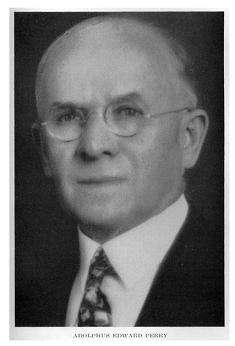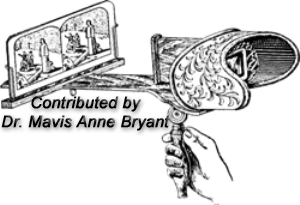|
Adolphus Edward Perry  1867 - 1939 Chronicles of Oklahoma Volume 18, No. 2 June, 1940 NECROLOGY Adolphus Edward Perry (1867-1939) written by Wm. H. Murray A. Edward Perry, the son of Edward Perry and Theotiste Melanie Brouillet Perry, was born in Montreal, Canada, July 23, 1867, and died in Denver, Colorado, July 29, 1939; he was buried at Rush Springs, Oklahoma. His father, Edward Perry, was in charge of construction of the M. K. & T. Railroad through the Indian Territory for his brother-in-law, John Scullin, of St. Louis. He brought his family to Denison, Texas, while the road was constructing, camping in the Indian Territory. Ed was one of a family of eight boys and one girl, Sophrenie Melanie. His early years were spent in Denison, where he attended school afterwards going to Montreal, Canada, to the Jesuits where he finished the regulation course of studies. He then went on the road as a "drummer" for several years. Many of his vacations were spent in the Indian Territory at the home of the late Governor Johnston, and on the ranches of the Colberts and the Loves. Thus Ed. grew to manhood with a knowledge and love of the old Indian Territory. Robert L. Owen was a great friend of the family, he and Will Perry having married Daisy and Fanny, the only daughters of Captain G. B. Hester of Boggy Depot. In 1888 Ed. his brother, H. T. V. Perry, and John Hodges opened a large store in Atoka, Oklahoma. During these early years he formed the enduring ties of friendship with Governor Green McCurtain, Bill Durant, Peter Hudson. Governor Bird (Chickasaw), Captain Charles LeFlore and many other prominent men. In 1889 and 1890, Ed. and H. T. V. made the move to the town of Cottonwood, afterwards known as Coalgate, where they opened a general merchandise store and coal mines. A year later Ed. decided to continue his education and enrolled in Holy Cross College, Worchester, Mass. He resumed his work in Coalgate in 1895 and on July 27, 1896, was married at Boggy Depot to Carrie LeFlore, daughter of Colonel Forbis LeFlore and Anne Mary LeFlore nee Maurer. Ed. Perry and H. T. V. Perry of Perry Brothers were the first mine operators to sign the union scale. My first acquaintance with Ed. Perry, known in political parlance as "Dynamite Ed." (to say the least, he was dynamic) was more than 40 years ago. At the meeting of the Constitutional Convention in Guthrie, he spent most of his time at my room and office. My confidence in him was such that I was not afraid of betrayal of a secret. The year of statehood he was vice-chairman, and was made manager, and his Republican associates insisted that he knew "something on Murray," because of his close connection during the Convention, and Perry's character is expressed in his reply: "I know nothing unconscionable, and if I did, I wouldn't tell you as it would be a betrayal of a friend." He and I had up to the time of his death a steadfast, unbroken friendship, and I am delighted when requested to write this observation, and only wish I had more space than The Chronicles can allow. Perry engaged in many enterprises, among which was manager of the Concho Gravel and Sand Company, dealing with the state. Never was there one whisper of dishonest course in his many deals with the state under several Governors of the State. He was always ready "to bid." I may observe that Perry's influence in the carving of counties was more potent than the delegate, as he got the county seat.  "An Oklahoman Abroad" from Sturm's
Oklahoma Magazine (Jan. Feb 1911), A Selected EditionBy Carrie LeFlore
Perry BiographyCarrie LeFlore Perry was born about 1874 at Boggy Depot, Choctaw Nation, the daughter of Forbis LeFlore (Choctaw) and his third wife, Anne Marie Maurer, whose father, like Forbis LeFlore's, was born in France. LeFlore, a well-known and respected leader in the Choctaw Nation, served as superintendent of Choctaw schools, as a tribal judge, and as a representative for the Choctaw Nation in Washington. Marie LeFlore, according to family tradition, was the granddaughter of one of Napoleon's bodyguards. Carrie, the youngest child of their marriage, grew up in a cosmopolitan, Catholic household in which French was often spoken. Carrie LeFlore was educated in the convent schools of the Sisters of the Sacred Heart, which were considered premier schools for well-bred young ladies. She first attended the Sacred Heart mission school in the Potawatomie reservation in Oklahoma Territory and later graduated from Maryville College in St. Louis. In 1896, she married Adolphus Edward Perry, a Canadian-born entrepreneur, who was set on making his fortune in Indian Territory. As an intermarried white citizen of the Choctaw Nation, Perry could thereafter conduct business as any native Choctaw could. But as a permitted resident in the Choctaw Nation, he had already established himself in the business community by the time they married. Born in 1867, Perry had moved with his family at age twelve to Denison, Texas, where he obtained his early education, which was continued under the Jesuits at Montreal. He began his career as a "drummer," spending his vacations in the Indian Territory, where he made friends among influential people such as Douglas Johnston and the Colbert and Love families of the Chickasaw Nation; Robbert L. Owen of the Cherokee Nation; and Choctaws such as Green McCurtain, Peter Hudson, and Charles LeFlore, Carrie's half brother. In 1888 he moved to Atoka, Choctaw Nation, where he entered the general mercantile trade with his brother. After a year, the Perrys moved their business to Cottonwood, which later became Coalgate, where they continued in the mercantile trade and began mining coal. Apparently backed by his father, the contractor who had overseen construction of the Missouri, Kansas & Texas Railroad, Perry flourished. Except for a period after 1891, when he attended Holy Cross College in Worcester, Massachusetts, Perry remained at Coalgate until he and Carrie LeFlore married. For a year after their marriage, Perry managed a ranch at Citra, Choctaw Nation, before returning to Coalgate, where he began to expand his enterprises. He remained in the mercantile business, developed his mining operations, and entered the real estate business. By 1905 he had amassed enough capital, influence, and confidence to offer the government $15 million for the segregated coal and asphalt lands of the Choctaw Nation, an offer the Secretary of the Interior refused. The wealth amassed by Perry provided his wife with the life style of a typical well-to-do woman of the late Genteel Period. Always referring to herself as Mrs. A. E. Perry, she entertained, traveled frequently to St. Louis, Kansas City, or elsewhere to visit friends, and, with her mother, spent time at Lake Michigan to escape the heat of the summer months. After more than a decade of marriage, her husband said of her, "She is the loveliest and sweetest of women. We are very fond of each other and are exceedingly congenial. We are almost always together." And, he said, "She is very retiring and dislikes notoriety." By the time he made these comments, Edward Perry was a well-known politician, whose own notoriety certainly eclipsed his wife's. As Oklahoma statehood approached, he had become active in Republican politics and had earned the nickname "Dynamite Ed" as a result of having tossed lighted sticks of dynamite from a moving excursion train to call attention to his political cause. In 1907 he served as chairman of the Oklahoma Republican Campaign Committee and the following year ran for chairman of the Oklahoma Republican Party. He lost but was rewarded with an appointment as vice-chairman. In the latter year, perhaps seeking relief from a difficult political season, Ed and Carrie Perry went on an extended tour of Europe. During their tour, Carrie wrote frequently to her mother, Anne Marie LeFlore, sometimes daily. The Perrys remained in Coalgate until 1920. After a year in Texas, they moved to Oklahoma City, where Ed tried the real estate and oil businesses before becoming president of the Concho Sand and Gravel Company, which position he held until he retired. He had continued to dabble in politics until 1926, when he withdrew from the lieutenant governor's race because the state would not allow him to appear on the ballot as "Dynamite" Ed Perry. Throughout this period, Carrie Perry faded from public view. Ed died while they were on vacation in Colorado in 1939. She lived on until July 27, 1966, her life all but obscured from public view. Despite her reticence, Carrie LeFlore Perry apparently had literary aspirations. As a student at Sacred Heart Mission, she had published a series of stories and narratives, for the most part related to Choctaw history and lore before Choctaw removal to the West. In 1905, she became a writer for the newly established Sturm's Oklahoma Magazine, publishing a piece on Choctaw and Chickasaw history. It was the publisher, O. P. Sturm, who in 1910 and 1911 published her 1908 series of letters to her mother as "An Oklahoman Abroad." Her last piece of writing, which appeared in 1928, was a biographical essay on her father, Forbis LeFlore. After Sturm called her an Indian when he introduced the series of letters in 1910, he received expressions of surprise from Easterners "that she could have manifested such vivacity, enthusiasm and intelligence as mark her articles." Sturm answered one stereotypical view with another, apparently believing it necessary to denigrate her Choctaw heritage: "With her mother the daughter of one of Napoleon's ‘Old Guard,' and her father Col. Forbis Le Flore, youngest brother of the first governor of the Choctaws, is it any wonder that Mrs. A. E. Perry should find that she is dominated by the hot blood of the French, only to be bewitched now and again by the call of the wild, and again that she often arises to the heights of her dignity through her English ancestors?. . .Like a large per cent of her people in Oklahoma, Mrs. Perry's Indian blood is the smallest of the strains; but her French blood not only dominates her physically but intellectually, and both evidence a high degree of culture." In reality, much of Carrie LeFlore Perry's writing is typical of that done by tribal writers, especially women, of the Five Civilized Tribes during the closing years of the nineteenth and early decades of the twentieth centuries. Possessed of a romantic, nostalgic, patriotic attachment to the past, they set about writing the folklore and history of their tribes, the subjects of the largest number of Perry's published works. Thus "An Oklahoman Abroad" is the odd work among her writings.  Canadian Biography Index Biography Index Susan Hawkins © 2024 If you find any of Grayson CountyTXGenWeb links inoperable, please send me a message. |